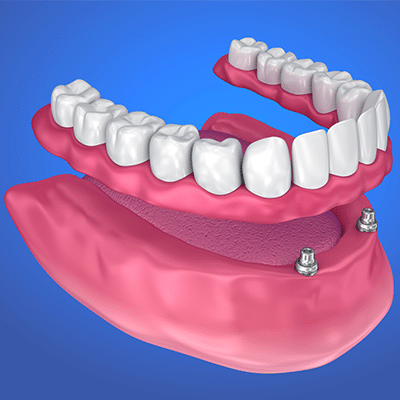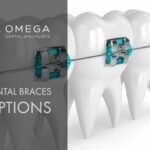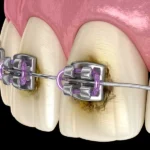What Is An Implant Overdenture?

If you are missing teeth due to age-related conditions, congenital abnormalities, accidents, or other injuries, one potential course of treatment is to have dentures made, including dental implant overdentures. The positives associated with dentures are that they can help return a natural and comfortable smile to your face. Some of the negatives, however, are that they can slip, fall out, interfere with speaking, cause embarrassing social gaffes, or force the wearer to avoid certain types of foods.
Patients may sometimes decide to replace all of their teeth to improve their appearance, or they might want to turn in their old dentures for something that fits more comfortably in their mouths. In those cases, the dental professionals here at Omega Dental Specialists might recommend the use of an implant-supported denture or dentures.
Table of Contents
Different Types of Dentures Available
If you are looking for the best dentures, then you will have to consider your personal dental needs and the types of dentures available. There are a number of options to help with correcting your teeth back to a healthier and more comfortable bite.
What are Traditional/Conventional Complete Full Dentures?
Full dentures will replace all teeth. They are probably the most common dentures that you might initially think of when you are wondering about denture options. If all teeth are badly compromised, they may be removed, leaving the gums empty. In this case, the full dentures will simply sit on top of the gums, replacing the teeth on the upper and lower jaws.
They are not connected to the jaw or anchored to existing teeth as other dentures might be. Instead, an adhesive is used to keep them in place. Most of the time, full dentures are placed within 8-12 weeks of the final teeth extractions.
What are Partial Dentures?
When you still have some good teeth, you might only need a partial denture. While caps and implants are used for individual tooth replacements, partial dentures will cover wider gaps of multiple missing teeth. This is an option if one or more teeth remain in the jaw.
A pink colored base is attached to a metal base that holds the partial dentures in place. The partial denture is removable, making them a convenient solution for those who need a number of teeth replaced. A partial denture will help keep the other teeth from shifting in place and deteriorating from overuse. Typically, partial dentures are made from acrylic materials.
What are Immediate Dentures?
Certain patients are good candidates for immediate dentures that are placed the same day as the extraction. Many patients don’t want to go any days without teeth, so this can be a good option for the right patient. The immediate denture will be created before the extractions are done. Rather than wait for the 8-12 weeks after extraction to get the dentures, the patient can wait to have extractions done until after the denture piece is made.
The difficulty with immediate dentures is your gums and jaw will change shape after teeth are extracted. Over time these dentures will not fit and will need to be replaced. Typically, these dentures only last around 5-7 years and may not fit as well as traditional dentures once the mouth heals from extraction. They do help control swelling and guide the healing.
What is Implant-Supported Denture?
A regular denture is crafted to conform to the shape of the patient’s mouth, but it only rests on the gums. This can allow the denture to slide, or cause clicking sounds. The patient may need to use adhesives to try to hold the denture in place, which can be difficult to apply for those with hand difficulties. An implant-supported denture, however, is supported by and attached to implants that are placed in the patient’s jaw; because of that it is more stable and looks more natural.
While traditional dentures aren’t often connected, they can be. Implants can be placed in the jawbone to hook the dentures into the mouth. This gives a much more secure fit and lasts for a long time. They are more affordable than the full mouth of individual implants and they function more naturally than traditional dentures that can slip. They will help preserve the gum tissue and jaw bone, but they are still removable for easy cleaning.
The implant-supported denture takes as long as traditional dentures. The tooth extraction and implants need to heal for about 12 weeks before the denture can be placed. Because implant-supported dentures are more secure, patients are able to eat steak, raw vegetables, and fruits they would otherwise avoid with traditional dentures that can slip.
Who is Implant-Supported Denture For?
We often find that patients who can benefit most from an implant-supported denture are those who do not have any teeth in their jaw. This could be due to natural aging or some type of injury. Our dentist will determine whether the patient has enough bone remaining in his/her jaw to fully support the implants.
You might be interested in an implant-supported denture if you find that you have difficulty with your traditional dentures. They may be rubbing on your gums and causing pain, or they might not adhere securely to your gums and might slip when you are talking or eating. If your thumbs or fingers are bent by arthritis, it can be difficult to apply creams or adhesives to firmly hold a denture in place. If any of these conditions apply to you, you might want to consider talking to one of our dental specialists.
How Does Implant-Supported Denture Work?
An implant that is used to support a denture is similar to one that is used to support an individual cap or crown, except that it serves as the anchor for an entire denture instead of a single tooth. If you are interested in an implant-supported denture, our dentist will first perform a thorough examination to determine if you are a good candidate for this procedure. The dentist will examine your jaw and gum structures to determine whether an implant can be placed in a manner that will sufficiently support the denture. If your jaws and gums are healthy, our doctor will discuss installing an implant-supported denture in your upper or lower jaw, or both.
The implants are secured directly into the bone of the patient’s jaw. They have a clip or special attachment that snaps right onto dentures that have been fashioned or adapted to fit into this attachment. Most patients report that any discomfort associated with this procedure is minimal, and lasts for only a short period.
These special attachments make it much easier to settle the denture into your mouth each morning. At night you simply pop out the denture and clean it as you would any other denture.
What is the Cost of Implant-Supported Denture?
As with all dental procedures, the cost for an implant-supported denture can vary from patient to patient. It depends on diagnostic costs, the work the dentist needs to do to prepare your jaw to receive the implant, and whether you are receiving single or double dentures. The cost may range anywhere from $6,500-10,000, but part of this expense may be covered by your dental insurance. From time to time, we also have special offers available on our website. We will be glad to file a predetermination to verify coverage of our proposed dental treatment, and you will be provided with a written cost quotation and explanation before the procedure begins.
What are Snap-On Dentures?
Snap-on dentures are actually the same thing as implant-supported dentures. They combine the security of implants with the convenience and lower cost of traditional dentures. They are sometimes called snap-on dentures because they can snap on and off of the metal posts that are implanted within the jaw.
After traditional dentures are worn for some time, a replacement denture may be needed to make up for lost bone. Snap-on or implant-supported dentures are easier to remove and clean. The bulk and thicker material of these kinds of supportive dentures might be harder to clean if they are fixed in the mouth, causing oral hygiene issues.
What are Overdentures?
Dentures can cause major bone loss in the jaw because of the rubbing of the dentures. Overdentures can be removed every night for cleaning and allowing the jaw to rest. Sometimes overdentures go over existing teeth. Good teeth can help anchor the dentures, though implants are more often used for this. Some overdentures can use clips or fasteners to stay in place.
What are Fixed Dentures?
Less popular, but still an option, are fixed dentures. These are kept in place by implants and the patient needs to brush and floss daily. The fixed dentures are connected to the implants by your dentist, creating the feel of natural teeth.
February 15, 2023What Is The Average Cost Of Braces In Houston?
February 01, 2023What You Need to Know About Dental Hygienists?
January 30, 2023What to Expect During the Wisdom Teeth Extraction
October 23, 2022Wisdom Tooth Removal Cost
October 23, 2022Dental Emergency, Open Saturday
October 23, 2022Full Guide to Dental Crown
July 26, 2022Should I Have My Wisdom Teeth Removed Before I Get Braces?
July 26, 2022Complete Guide to Wisdom Tooth Removal





